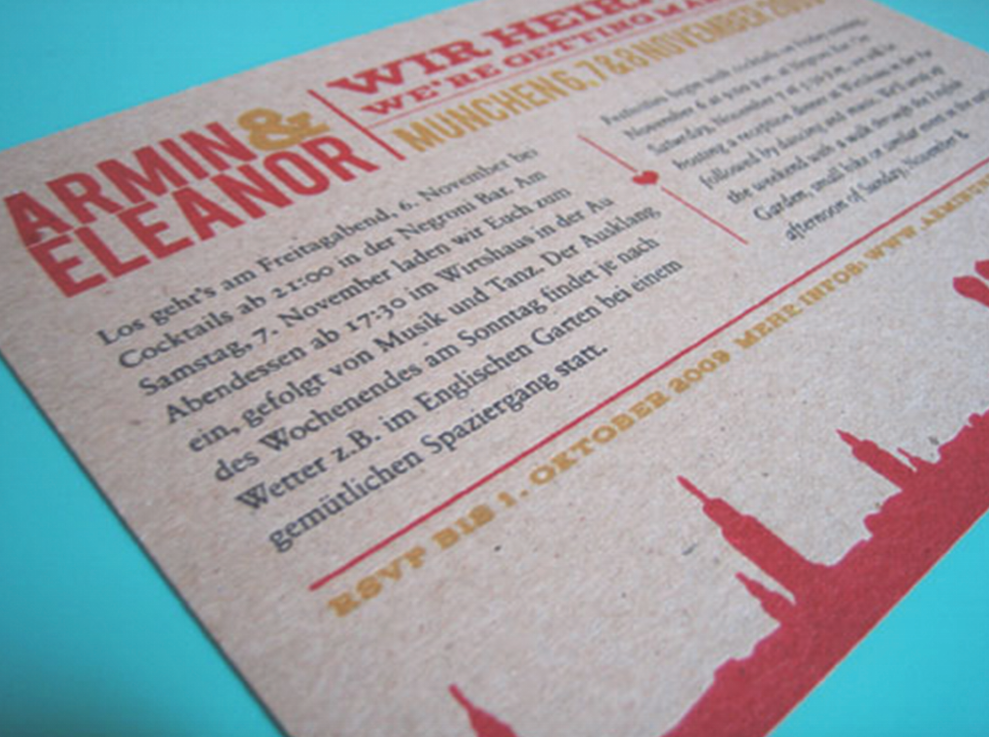The Language of Love: 10 Tips for a Bilingual Wedding
/Photo by Carly Romeo & Co.
As our world grows smaller and our countries more ethnically diverse, weddings with couples from two or more cultures are becoming more commonplace.
Some couples opt to have a wedding celebration in each of their native countries (my husband and I had one in Munich, Germany where he’s from and a second one several months later in California). If it isn’t feasible to have two weddings, another option is to have one ceremony and include as much of both cultures in it as possible.
However, hosting a wedding for guests who don’t speak the same language runs the risk of many people feeling out of the loop. Here are some ways to keep everyone engaged and make all guests feel included.
Photo by e.m.Papers
1. Make sure guests receive wedding invitations and/or wedding communication in their native language.
There are many ways to do this: create bilingual paper goods, or make two (or more!) sets of stationery — one in each language. If all your guests are online, and you are less concerned with formality, you can go entirely paperless, making it easier to create invitations and other communication in multiple languages.
2. Consider a mixed-language ceremony.
Your wedding ceremony is the heart of the event. Ideally none of your guests will have to feel lost or tuned out while it’s happening. If possible, keep it short and sweet. If you both understand one another’s native language, you can both say your vows in your native language. If the ceremony is primarily in one language, intersperse it with poems, songs or readings in a second language or say key phrases like “You may now kiss the bride” in both languages.
3. Split the ceremony.
In Germany, where I got married, a civil ceremony or Standesamt takes place first, followed by a religious or church wedding ceremony separately. Our civil ceremony was in German, and our wedding ceremony was in English.
4. Create a wedding ceremony program in each language.
If a linguistic mash-up won’t work in your ceremony, create dual-language programs with sections dedicated to explaining the wedding traditions of each culture. Translate poems, wedding party roles, and songs.
5. Add subtitles to reception slideshows or movies.
If you’ve put together a film or slideshow for the wedding reception, include subtitles, or consider making it a wordless montage and adding music from both cultures instead.
6. Incorporate food and music from each culture.
Photo by Carly Romeo & Co.
Food and music are universal and transcend language. Alternate courses with a dish from each culture or have both cuisines represented in your wedding buffet. If you’re having a wedding DJ, ask him or her to learn a few key phrases in both languages. Better yet, if the DJ speaks both languages (for example Spanish and English), ask him or her to use a linguistic mash-up: “Ok, ahora everybody bailando!”
7. Hire or assign interpreters.
If you can’t hire an interpreter for the wedding, ask friends that speak dual languages to help out as a wedding gift. Strategically sit them between important guests (like parents) so they can do some light translating during meals and at key moments.
8. Come up with a few buzzwords to teach everyone.
For example, instead of toasting Cheers!, teach everyone to say Prost, Salud, Kanpai or Skål. Share translations for kiss, love, happiness, and other phrases that are appropriate to use at a wedding celebration. Guests can lean on these as needed to connect with one another.
9. Plan smaller, single-language events leading up to the ceremony.
In some cultures, like Denmark, it’s traditional for every guest to make a speech. This can be difficult for guests that don’t understand. Plan to have smaller, more intimate events, like a breakfast or cocktail hour, leading up to the big day where these cultural traditions can be shared without the burden of trying to translate them.
10. Plan language-independent icebreaker activities before or after your wedding.
If you’re hosting events like a barbecue or picnic on the day before the wedding, plan for some common group sports (like soccer), card games, or board games like chess that cut across cultural barriers and help guests to get to know one another without needing to make conversation.
This article originally appeared in Volume Two of Catalyst Wedding Magazine. Order your copy for more great articles.
ELEANOR MAYRHOFER
Eleanor Mayrhofer is the owner and principal designer at e.m.papers, a download and print stationery company. A California transplant, she lives with her husband in Munich, Germany.
























